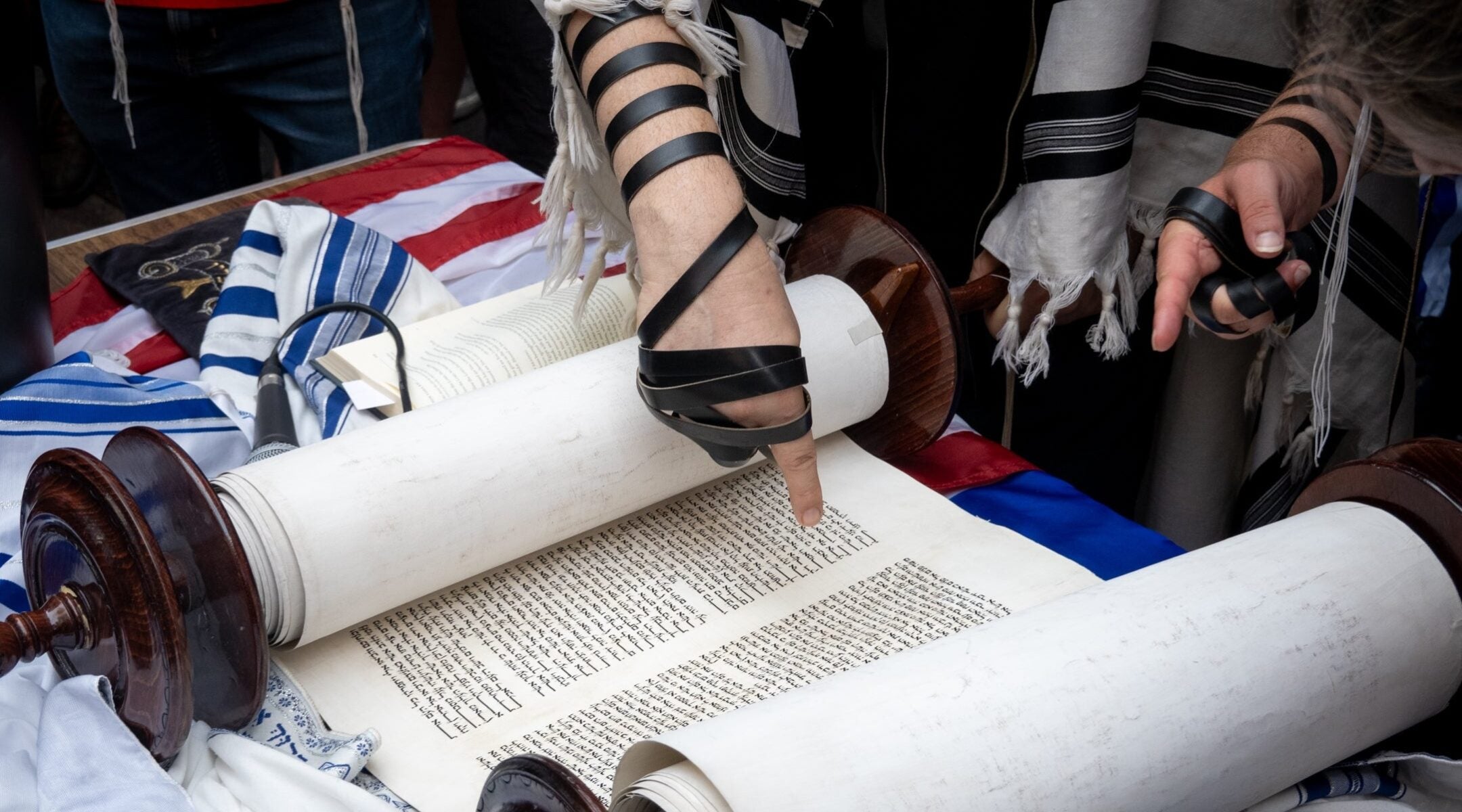Earlier this year, the National Endowment for the Humanities was shedding staff and canceling hundreds of grants to the museums, libraries and scholars that have traditionally relied on federal funding to help Americans engage with history, culture and ideas.
The Trump administration said the agency was a waste of taxpayer money and suggested eliminating it entirely.
By August, however, the NEH was announcing new awards, including its largest one ever: $10 million to the University of Virginia for a project tied to the 250th anniversary of the Declaration of Independence in 2026. In its 60-year history, NEH had rarely given more than a few hundred thousand dollars to any single project.
That record lasted just six weeks. On Monday, the NEH announced an even larger, $10.4 million grant for a nationwide “Jewish Civilization Project” aimed at combating antisemitism. The group behind the project is Tikvah, a New York-based think tank and education center dedicated to advancing “Jewish excellence and Western civilization.”
Tikvah, which means “hope” in Hebrew, is identified with the conservative movement in American politics. Right-wing pundit Ben Shapiro, Free Press co-founder Bari Weiss, and ex-GOP strategist turned pro-Israel author Dan Senor are slated to receive awards at its upcoming conference. Among the prominent alumni of Tikvah’s programs is Jacob Reses, chief of staff to Vice President J.D. Vance.
In Israeli politics, Tikvah is associated with its Conservatism Conference, and with the Kohelet Policy Forum, the intellectual force behind controversial efforts to curb the power of Israel’s judiciary. Kohelet’s founder, Moshe Koppel, serves on Tikvah’s board. The group is also known for helping Benjamin Netanyahu publish his autobiography during his most recent campaign for office in 2022.
But Tikvah’s reach and influence extend well beyond the right. Its education programs have been taken up by a wide array of Jewish schools. Last year, it launched Emet Classical Academy, a selective Jewish day school on Manhattan’s Upper East Side that emphasizes “the great intellectual history of the West.” The school opened with about 40 students and offers Latin and Greek alongside Hebrew and Jewish studies.
According to the NEH, the new project will create K-12 curricula, university courses, fellowships for students and journalists, a slate of public programs and a series of scholarly books that emphasize Jewish contributions to Western and American civilization.
The initiative is designed to trace Jewish civilization across time, from ancient scripture to modern culture. It will highlight the Bible and the Talmud alongside Jewish contributions in literature, art and philosophy, while taking up themes such as Zionism’s development, the role of Jewish ideas in shaping Western democracy, and the dilemmas Jews face today.
Tikvah CEO Eric Cohen called the grant “an ambitious educational project” that answers “the perverse ideology of anti-Semitism with the enduring majesty of Jewish civilization.”
In an interview, Cohen said the NEH invited Tikvah to apply and that the proposal then went through “multiple rounds of rigorous review” with staff and outside experts before approval. He declined to say who issued the invitation, adding that NEH should “speak for their own processes.” The NEH did not respond to a request for comment.
The NEH’s press release frames the project as part of a broader push to fight antisemitism through the humanities. “While it is essential to combat the rise of anti-Semitism in the political and legal arenas, the humanities also have a vital role to play in this fight,” the agency’s acting chair Michael McDonald said.
McDonald also linked the grant to one of the new priorities outlined by the agency earlier this year: the promotion of American exceptionalism. He said the project would demonstrate that “the sinister and hate-filled attacks on Jewish people that we have been witnessing on American campuses and streets are, at a deeper level, also attacks on the very foundations that have made the United States the exceptional nation that it is.”

Florida Governor Ron DeSantis, Tikvah Fund Executive Director Eric Cohen and former Secretary of State Mike Pompeo speaking at the Jewish Leadership Conference at Chelsea Piers in New York City on Sunday, June 12, 2022. (Photo Credit: Sean Smith)
The unprecedented award for Tikvah comes amid a period of dramatic growth for the organization. Cohen noted that Tikvah’s U.S. program budget grew from roughly $19.3 million in 2024 to a pre-NEH 2025 budget of $24.5 million, and said the grant will accelerate, not initiate, expansion.
The award also comes months after the NEH terminated grants for dozens of Jewish programs, as part of the cuts mandated by the White House. The Klezmer Institute lost its federal funding for an archive of klezmer compositions. Translators working on Yiddish women’s writing, Ukrainian-Jewish poetry and Soviet Holocaust literature were told their support was ending. A Psalms project at Duke Divinity School was canceled along with hundreds of others. Many recipients said they learned of the cuts from form letters stating that their projects no longer fit “the President’s agenda.”
Writing at the time, historian Pamela Nadell attempted to take stock of what could be lost due to the cuts. She noted that her own forthcoming book, tracing the history of antisemitism in the United States, received NEH funding and lamented the Jewish stories that won’t be told absent public funding.
“This history is more essential than ever today to counter the rising tide of antisemitism in this nation,” she wrote.
Asked to comment on the Tikvah announcement, she invoked the story of a 19th-century Jewish movement called Wissenschaft des Judentums, a German name meaning the scientific study of Judaism.
“Two hundred years ago in Germany, a group of young Jews also planned to educate the world about Jewish civilization to eradicate Jew hatred,” she said. “That they and those who followed them with similar proposals failed does not bode well for mitigating antisemitism with Tikvah’s ‘Jewish Civilization Project.’”
For many scholars in the field of Jewish studies who had seen the funding slashed, it felt that the grant to Tikvah came at the expense of their own work.
“Every Jewish Studies colleague I know who had an NEH grant saw their funding cut earlier this year. Now we know where the money went,” Samuel Brody, a professor of religion at the University of Kansas, wrote in a post on Bluesky.
Cohen declined to address the cuts, saying he was focused on his own project and humbled by the award to Tikvah.
“The NEH clearly felt that our distinctive approach and our educational capabilities are much needed in the current cultural moment,” he said, adding, “I’m excited about our approach. That’s where my focus is.”
Some are welcoming the break with the past.
“The usual formula of diversity training and Holocaust education has not succeeded. The Tikvah Fund has a different approach. It believes that people should know something about the Jews beyond that others have tried to kill us,” said Elliot Kaufman, a member of the Wall Street Journal editorial board who participated in Tikvah educational programs as a student at Stanford, in an email.
Steve Mcguire, a conservative scholar and commentator on higher education, said the grant is important because it will allow Tikvah to offer university students something different from what they can get on campus. He believes that antisemitism spreads through the pervasive teaching of “anti-American and anti-Western ideologies.”
“We must give Americans, and especially American students, opportunities to learn about the great history of Jewish ideas and the contributions those ideas, and Jewish people, have made to America and Western civilization,” he said in an email. “True education can be a powerful antidote to the stunted ideological perspectives that too many students hear.”
Others say they see the award as evidence of favoritism and the politicization of federal funding for the humanities.
Rabbi Jill Jacobs, CEO of T’ruah, a left-wing Jewish advocacy group, said the grant elevates a group that is not representative of the majority of American Jews, while sidelining other Jewish initiatives.
“Tikvah has a long history of pushing conservative ideas into American Jewish spaces, presenting them as Jewish ideas, when these are really ideas that are coming out of the either secular or Christian right-wing world,” Jacobs said in an interview.
She argues that the Trump administration’s commitment to fighting antisemitism is insincere and instead advances an authoritarian agenda, using the grant to enlist Tikvah in the effort.
“The Trump administration is saying, we are giving money to the Jewish think tank that is going to support us in our goals of undermining democracy and liberal democratic institutions and feminism and diversity and pluralism,” Jacobs.
Yehuda Kurtzer, president of the Shalom Hartman Institute of North America, argued that the grant should be understood as part of a broader authoritarian attempt to reshape education that some Jews have acquiesced to at their own peril.
“Authoritarians cannot win in a free marketplace of ideas in a healthy liberal democracy,” he wrote in a new essay. “Their methods – to coerce, to deceive, to violate norms, or to inflame populist sentiment – are a confession of their weakness. This is the real story of the Trump administration’s approach to remaking education in America in its own ideological image, a battle it cannot win on the merits.”
Asked to respond to the criticism, Cohen insisted the project is rooted in traditional humanistic study and rejected the idea that it promotes a narrow ideological aim of the right.
“The categories of my critics are not of interest to me. What’s of interest to me is Jewish civilization,” he said. “The best response to them is the seriousness of the work that we do and the intellectual and educational mission of the institution.”
In an email, he also shared an excerpt from TIkvah’s grant proposal, an elaboration of the argument that the best anecdote to antisemitism is the illumination of Jewish contributions to Western history.
“My answer to the critics: come learn with us,” he wrote.
JTA has documented Jewish history in real-time for over a century. Keep our journalism strong by joining us in supporting independent, award-winning reporting.





